Detailed Critical Analysis of Edgar Allan Poe's 'The Raven' Poem
VerifiedAdded on 2023/01/03
|6
|2400
|75
Homework Assignment
AI Summary
This assignment presents a student's analysis of Edgar Allan Poe's poem, 'The Raven'. The assignment begins with a translation of the poem, followed by critical thinking questions that delve into the poem's major details, including the story, imagery, and recurring symbols such as the raven itself and the word 'Nevermore'. The analysis examines the poem's themes of lost love, grief, and despair, highlighting the narrator's descent into sorrow and his inability to escape the memories of his beloved Lenore. The student explores the poem's dark and evocative atmosphere, the symbolic representation of the raven, and the central idea of the lasting impact of loss and the enduring nature of sorrow, concluding that the poem expresses the universality of grief and the lasting consequences of death.
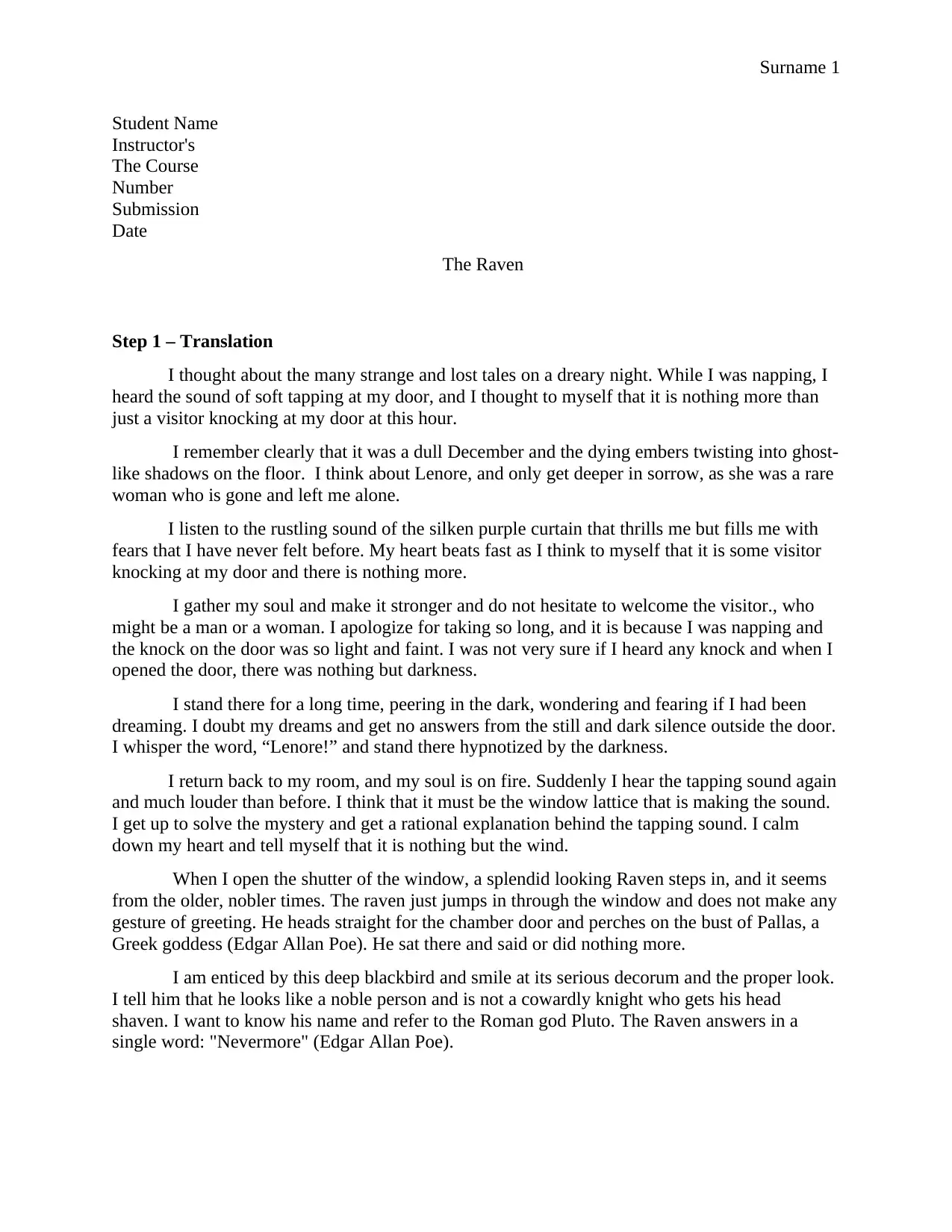
Surname 1
Student Name
Instructor's
The Course
Number
Submission
Date
The Raven
Step 1 – Translation
I thought about the many strange and lost tales on a dreary night. While I was napping, I
heard the sound of soft tapping at my door, and I thought to myself that it is nothing more than
just a visitor knocking at my door at this hour.
I remember clearly that it was a dull December and the dying embers twisting into ghost-
like shadows on the floor. I think about Lenore, and only get deeper in sorrow, as she was a rare
woman who is gone and left me alone.
I listen to the rustling sound of the silken purple curtain that thrills me but fills me with
fears that I have never felt before. My heart beats fast as I think to myself that it is some visitor
knocking at my door and there is nothing more.
I gather my soul and make it stronger and do not hesitate to welcome the visitor., who
might be a man or a woman. I apologize for taking so long, and it is because I was napping and
the knock on the door was so light and faint. I was not very sure if I heard any knock and when I
opened the door, there was nothing but darkness.
I stand there for a long time, peering in the dark, wondering and fearing if I had been
dreaming. I doubt my dreams and get no answers from the still and dark silence outside the door.
I whisper the word, “Lenore!” and stand there hypnotized by the darkness.
I return back to my room, and my soul is on fire. Suddenly I hear the tapping sound again
and much louder than before. I think that it must be the window lattice that is making the sound.
I get up to solve the mystery and get a rational explanation behind the tapping sound. I calm
down my heart and tell myself that it is nothing but the wind.
When I open the shutter of the window, a splendid looking Raven steps in, and it seems
from the older, nobler times. The raven just jumps in through the window and does not make any
gesture of greeting. He heads straight for the chamber door and perches on the bust of Pallas, a
Greek goddess (Edgar Allan Poe). He sat there and said or did nothing more.
I am enticed by this deep blackbird and smile at its serious decorum and the proper look.
I tell him that he looks like a noble person and is not a cowardly knight who gets his head
shaven. I want to know his name and refer to the Roman god Pluto. The Raven answers in a
single word: "Nevermore" (Edgar Allan Poe).
Student Name
Instructor's
The Course
Number
Submission
Date
The Raven
Step 1 – Translation
I thought about the many strange and lost tales on a dreary night. While I was napping, I
heard the sound of soft tapping at my door, and I thought to myself that it is nothing more than
just a visitor knocking at my door at this hour.
I remember clearly that it was a dull December and the dying embers twisting into ghost-
like shadows on the floor. I think about Lenore, and only get deeper in sorrow, as she was a rare
woman who is gone and left me alone.
I listen to the rustling sound of the silken purple curtain that thrills me but fills me with
fears that I have never felt before. My heart beats fast as I think to myself that it is some visitor
knocking at my door and there is nothing more.
I gather my soul and make it stronger and do not hesitate to welcome the visitor., who
might be a man or a woman. I apologize for taking so long, and it is because I was napping and
the knock on the door was so light and faint. I was not very sure if I heard any knock and when I
opened the door, there was nothing but darkness.
I stand there for a long time, peering in the dark, wondering and fearing if I had been
dreaming. I doubt my dreams and get no answers from the still and dark silence outside the door.
I whisper the word, “Lenore!” and stand there hypnotized by the darkness.
I return back to my room, and my soul is on fire. Suddenly I hear the tapping sound again
and much louder than before. I think that it must be the window lattice that is making the sound.
I get up to solve the mystery and get a rational explanation behind the tapping sound. I calm
down my heart and tell myself that it is nothing but the wind.
When I open the shutter of the window, a splendid looking Raven steps in, and it seems
from the older, nobler times. The raven just jumps in through the window and does not make any
gesture of greeting. He heads straight for the chamber door and perches on the bust of Pallas, a
Greek goddess (Edgar Allan Poe). He sat there and said or did nothing more.
I am enticed by this deep blackbird and smile at its serious decorum and the proper look.
I tell him that he looks like a noble person and is not a cowardly knight who gets his head
shaven. I want to know his name and refer to the Roman god Pluto. The Raven answers in a
single word: "Nevermore" (Edgar Allan Poe).
Paraphrase This Document
Need a fresh take? Get an instant paraphrase of this document with our AI Paraphraser
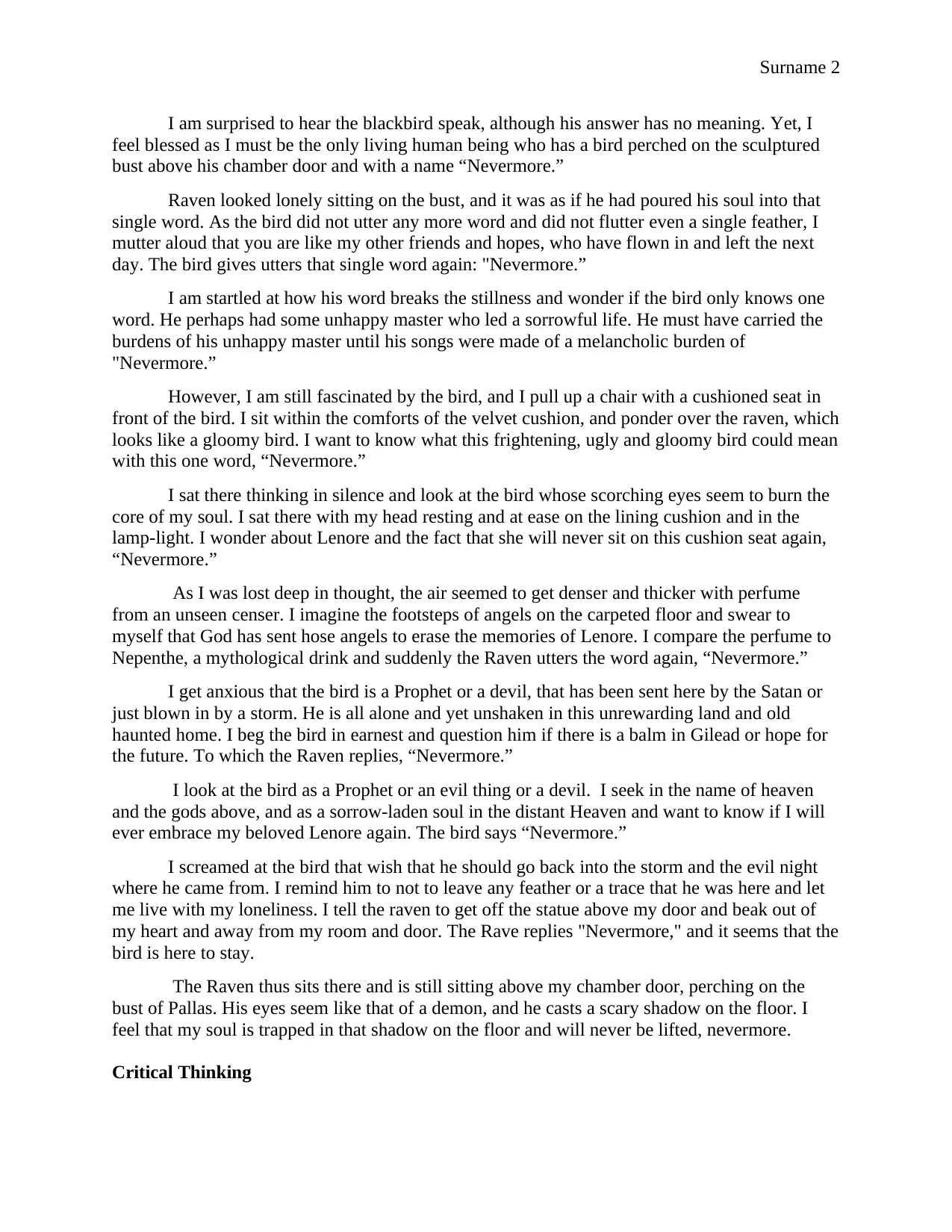
Surname 2
I am surprised to hear the blackbird speak, although his answer has no meaning. Yet, I
feel blessed as I must be the only living human being who has a bird perched on the sculptured
bust above his chamber door and with a name “Nevermore.”
Raven looked lonely sitting on the bust, and it was as if he had poured his soul into that
single word. As the bird did not utter any more word and did not flutter even a single feather, I
mutter aloud that you are like my other friends and hopes, who have flown in and left the next
day. The bird gives utters that single word again: "Nevermore.”
I am startled at how his word breaks the stillness and wonder if the bird only knows one
word. He perhaps had some unhappy master who led a sorrowful life. He must have carried the
burdens of his unhappy master until his songs were made of a melancholic burden of
"Nevermore.”
However, I am still fascinated by the bird, and I pull up a chair with a cushioned seat in
front of the bird. I sit within the comforts of the velvet cushion, and ponder over the raven, which
looks like a gloomy bird. I want to know what this frightening, ugly and gloomy bird could mean
with this one word, “Nevermore.”
I sat there thinking in silence and look at the bird whose scorching eyes seem to burn the
core of my soul. I sat there with my head resting and at ease on the lining cushion and in the
lamp-light. I wonder about Lenore and the fact that she will never sit on this cushion seat again,
“Nevermore.”
As I was lost deep in thought, the air seemed to get denser and thicker with perfume
from an unseen censer. I imagine the footsteps of angels on the carpeted floor and swear to
myself that God has sent hose angels to erase the memories of Lenore. I compare the perfume to
Nepenthe, a mythological drink and suddenly the Raven utters the word again, “Nevermore.”
I get anxious that the bird is a Prophet or a devil, that has been sent here by the Satan or
just blown in by a storm. He is all alone and yet unshaken in this unrewarding land and old
haunted home. I beg the bird in earnest and question him if there is a balm in Gilead or hope for
the future. To which the Raven replies, “Nevermore.”
I look at the bird as a Prophet or an evil thing or a devil. I seek in the name of heaven
and the gods above, and as a sorrow-laden soul in the distant Heaven and want to know if I will
ever embrace my beloved Lenore again. The bird says “Nevermore.”
I screamed at the bird that wish that he should go back into the storm and the evil night
where he came from. I remind him to not to leave any feather or a trace that he was here and let
me live with my loneliness. I tell the raven to get off the statue above my door and beak out of
my heart and away from my room and door. The Rave replies "Nevermore," and it seems that the
bird is here to stay.
The Raven thus sits there and is still sitting above my chamber door, perching on the
bust of Pallas. His eyes seem like that of a demon, and he casts a scary shadow on the floor. I
feel that my soul is trapped in that shadow on the floor and will never be lifted, nevermore.
Critical Thinking
I am surprised to hear the blackbird speak, although his answer has no meaning. Yet, I
feel blessed as I must be the only living human being who has a bird perched on the sculptured
bust above his chamber door and with a name “Nevermore.”
Raven looked lonely sitting on the bust, and it was as if he had poured his soul into that
single word. As the bird did not utter any more word and did not flutter even a single feather, I
mutter aloud that you are like my other friends and hopes, who have flown in and left the next
day. The bird gives utters that single word again: "Nevermore.”
I am startled at how his word breaks the stillness and wonder if the bird only knows one
word. He perhaps had some unhappy master who led a sorrowful life. He must have carried the
burdens of his unhappy master until his songs were made of a melancholic burden of
"Nevermore.”
However, I am still fascinated by the bird, and I pull up a chair with a cushioned seat in
front of the bird. I sit within the comforts of the velvet cushion, and ponder over the raven, which
looks like a gloomy bird. I want to know what this frightening, ugly and gloomy bird could mean
with this one word, “Nevermore.”
I sat there thinking in silence and look at the bird whose scorching eyes seem to burn the
core of my soul. I sat there with my head resting and at ease on the lining cushion and in the
lamp-light. I wonder about Lenore and the fact that she will never sit on this cushion seat again,
“Nevermore.”
As I was lost deep in thought, the air seemed to get denser and thicker with perfume
from an unseen censer. I imagine the footsteps of angels on the carpeted floor and swear to
myself that God has sent hose angels to erase the memories of Lenore. I compare the perfume to
Nepenthe, a mythological drink and suddenly the Raven utters the word again, “Nevermore.”
I get anxious that the bird is a Prophet or a devil, that has been sent here by the Satan or
just blown in by a storm. He is all alone and yet unshaken in this unrewarding land and old
haunted home. I beg the bird in earnest and question him if there is a balm in Gilead or hope for
the future. To which the Raven replies, “Nevermore.”
I look at the bird as a Prophet or an evil thing or a devil. I seek in the name of heaven
and the gods above, and as a sorrow-laden soul in the distant Heaven and want to know if I will
ever embrace my beloved Lenore again. The bird says “Nevermore.”
I screamed at the bird that wish that he should go back into the storm and the evil night
where he came from. I remind him to not to leave any feather or a trace that he was here and let
me live with my loneliness. I tell the raven to get off the statue above my door and beak out of
my heart and away from my room and door. The Rave replies "Nevermore," and it seems that the
bird is here to stay.
The Raven thus sits there and is still sitting above my chamber door, perching on the
bust of Pallas. His eyes seem like that of a demon, and he casts a scary shadow on the floor. I
feel that my soul is trapped in that shadow on the floor and will never be lifted, nevermore.
Critical Thinking
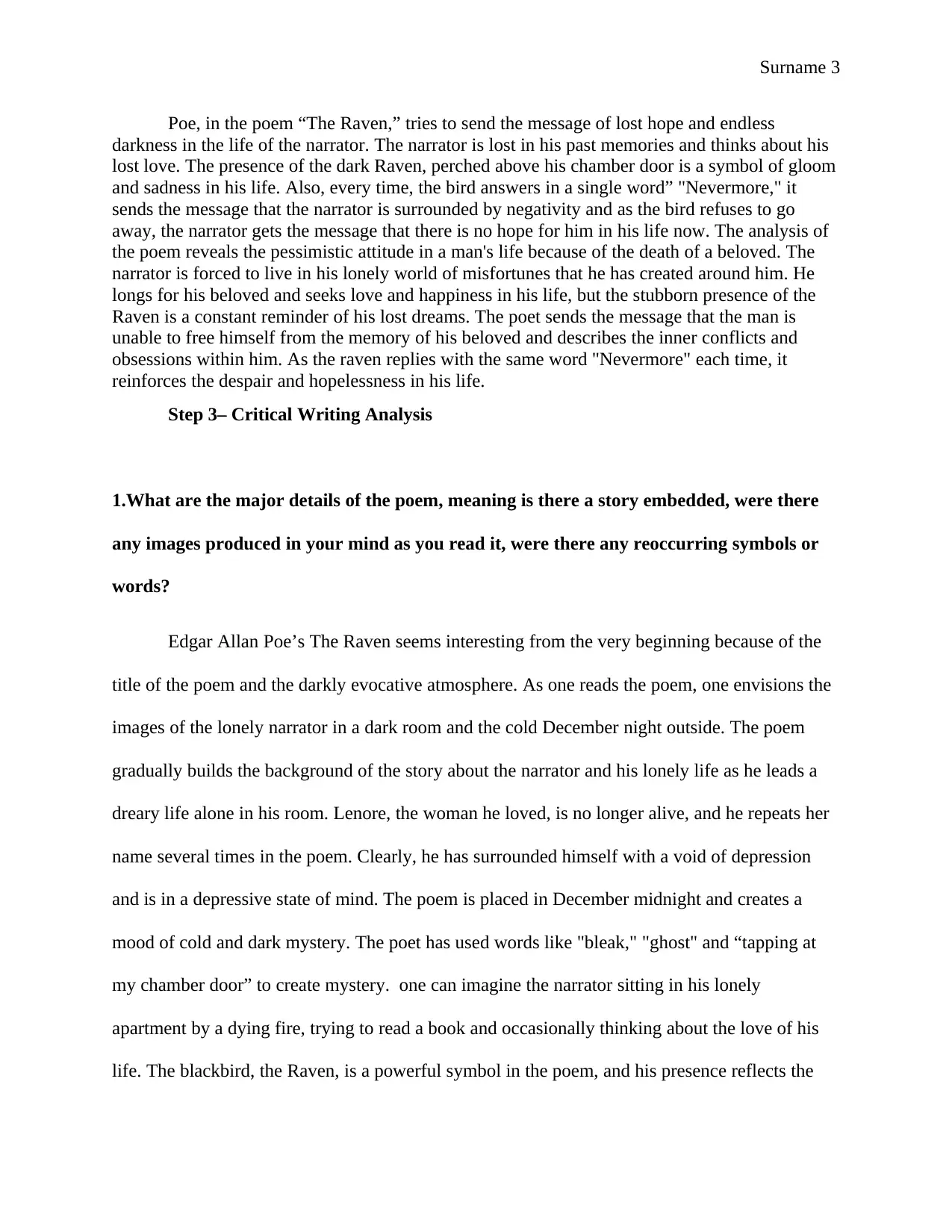
Surname 3
Poe, in the poem “The Raven,” tries to send the message of lost hope and endless
darkness in the life of the narrator. The narrator is lost in his past memories and thinks about his
lost love. The presence of the dark Raven, perched above his chamber door is a symbol of gloom
and sadness in his life. Also, every time, the bird answers in a single word” "Nevermore," it
sends the message that the narrator is surrounded by negativity and as the bird refuses to go
away, the narrator gets the message that there is no hope for him in his life now. The analysis of
the poem reveals the pessimistic attitude in a man's life because of the death of a beloved. The
narrator is forced to live in his lonely world of misfortunes that he has created around him. He
longs for his beloved and seeks love and happiness in his life, but the stubborn presence of the
Raven is a constant reminder of his lost dreams. The poet sends the message that the man is
unable to free himself from the memory of his beloved and describes the inner conflicts and
obsessions within him. As the raven replies with the same word "Nevermore" each time, it
reinforces the despair and hopelessness in his life.
Step 3– Critical Writing Analysis
1.What are the major details of the poem, meaning is there a story embedded, were there
any images produced in your mind as you read it, were there any reoccurring symbols or
words?
Edgar Allan Poe’s The Raven seems interesting from the very beginning because of the
title of the poem and the darkly evocative atmosphere. As one reads the poem, one envisions the
images of the lonely narrator in a dark room and the cold December night outside. The poem
gradually builds the background of the story about the narrator and his lonely life as he leads a
dreary life alone in his room. Lenore, the woman he loved, is no longer alive, and he repeats her
name several times in the poem. Clearly, he has surrounded himself with a void of depression
and is in a depressive state of mind. The poem is placed in December midnight and creates a
mood of cold and dark mystery. The poet has used words like "bleak," "ghost" and “tapping at
my chamber door” to create mystery. one can imagine the narrator sitting in his lonely
apartment by a dying fire, trying to read a book and occasionally thinking about the love of his
life. The blackbird, the Raven, is a powerful symbol in the poem, and his presence reflects the
Poe, in the poem “The Raven,” tries to send the message of lost hope and endless
darkness in the life of the narrator. The narrator is lost in his past memories and thinks about his
lost love. The presence of the dark Raven, perched above his chamber door is a symbol of gloom
and sadness in his life. Also, every time, the bird answers in a single word” "Nevermore," it
sends the message that the narrator is surrounded by negativity and as the bird refuses to go
away, the narrator gets the message that there is no hope for him in his life now. The analysis of
the poem reveals the pessimistic attitude in a man's life because of the death of a beloved. The
narrator is forced to live in his lonely world of misfortunes that he has created around him. He
longs for his beloved and seeks love and happiness in his life, but the stubborn presence of the
Raven is a constant reminder of his lost dreams. The poet sends the message that the man is
unable to free himself from the memory of his beloved and describes the inner conflicts and
obsessions within him. As the raven replies with the same word "Nevermore" each time, it
reinforces the despair and hopelessness in his life.
Step 3– Critical Writing Analysis
1.What are the major details of the poem, meaning is there a story embedded, were there
any images produced in your mind as you read it, were there any reoccurring symbols or
words?
Edgar Allan Poe’s The Raven seems interesting from the very beginning because of the
title of the poem and the darkly evocative atmosphere. As one reads the poem, one envisions the
images of the lonely narrator in a dark room and the cold December night outside. The poem
gradually builds the background of the story about the narrator and his lonely life as he leads a
dreary life alone in his room. Lenore, the woman he loved, is no longer alive, and he repeats her
name several times in the poem. Clearly, he has surrounded himself with a void of depression
and is in a depressive state of mind. The poem is placed in December midnight and creates a
mood of cold and dark mystery. The poet has used words like "bleak," "ghost" and “tapping at
my chamber door” to create mystery. one can imagine the narrator sitting in his lonely
apartment by a dying fire, trying to read a book and occasionally thinking about the love of his
life. The blackbird, the Raven, is a powerful symbol in the poem, and his presence reflects the
⊘ This is a preview!⊘
Do you want full access?
Subscribe today to unlock all pages.

Trusted by 1+ million students worldwide
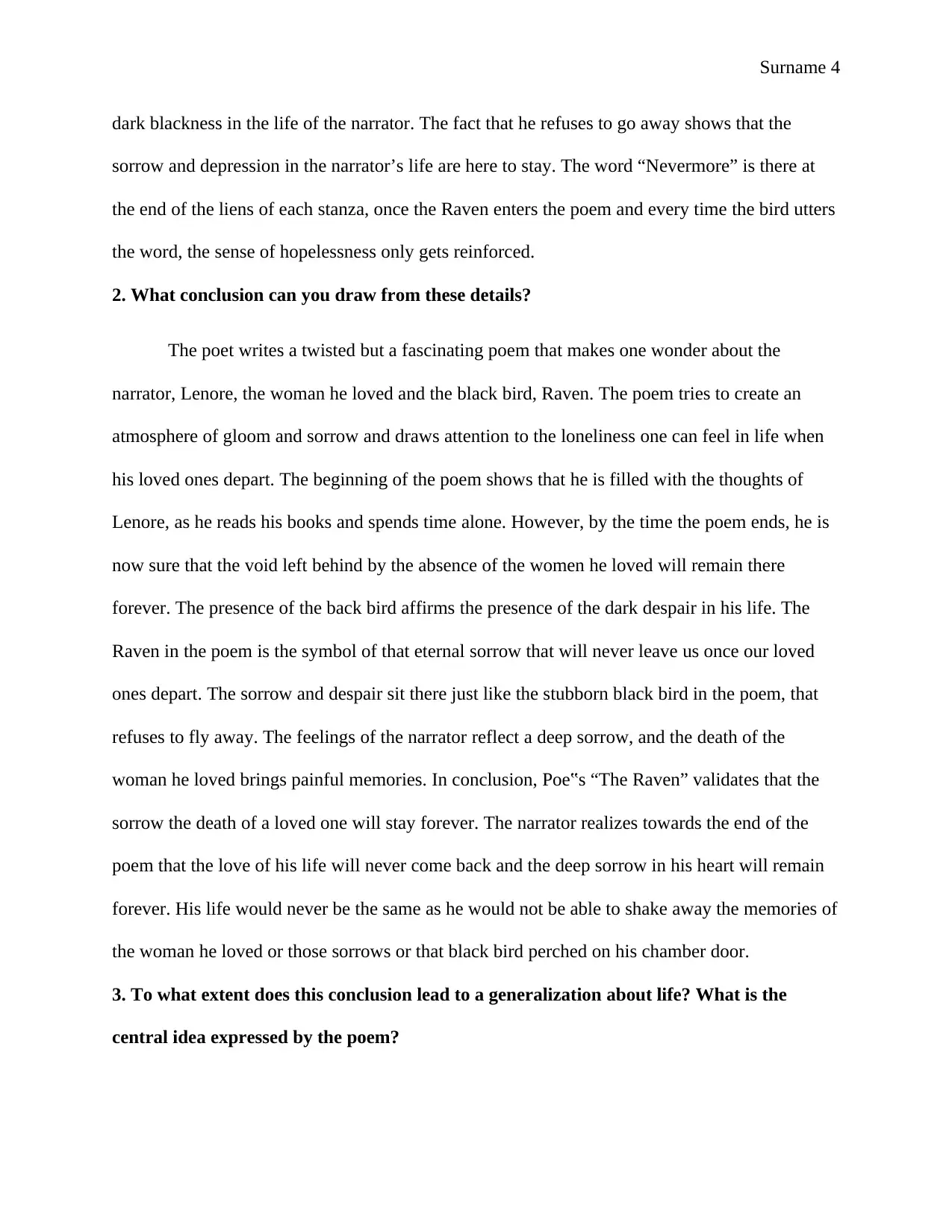
Surname 4
dark blackness in the life of the narrator. The fact that he refuses to go away shows that the
sorrow and depression in the narrator’s life are here to stay. The word “Nevermore” is there at
the end of the liens of each stanza, once the Raven enters the poem and every time the bird utters
the word, the sense of hopelessness only gets reinforced.
2. What conclusion can you draw from these details?
The poet writes a twisted but a fascinating poem that makes one wonder about the
narrator, Lenore, the woman he loved and the black bird, Raven. The poem tries to create an
atmosphere of gloom and sorrow and draws attention to the loneliness one can feel in life when
his loved ones depart. The beginning of the poem shows that he is filled with the thoughts of
Lenore, as he reads his books and spends time alone. However, by the time the poem ends, he is
now sure that the void left behind by the absence of the women he loved will remain there
forever. The presence of the back bird affirms the presence of the dark despair in his life. The
Raven in the poem is the symbol of that eternal sorrow that will never leave us once our loved
ones depart. The sorrow and despair sit there just like the stubborn black bird in the poem, that
refuses to fly away. The feelings of the narrator reflect a deep sorrow, and the death of the
woman he loved brings painful memories. In conclusion, Poe‟s “The Raven” validates that the
sorrow the death of a loved one will stay forever. The narrator realizes towards the end of the
poem that the love of his life will never come back and the deep sorrow in his heart will remain
forever. His life would never be the same as he would not be able to shake away the memories of
the woman he loved or those sorrows or that black bird perched on his chamber door.
3. To what extent does this conclusion lead to a generalization about life? What is the
central idea expressed by the poem?
dark blackness in the life of the narrator. The fact that he refuses to go away shows that the
sorrow and depression in the narrator’s life are here to stay. The word “Nevermore” is there at
the end of the liens of each stanza, once the Raven enters the poem and every time the bird utters
the word, the sense of hopelessness only gets reinforced.
2. What conclusion can you draw from these details?
The poet writes a twisted but a fascinating poem that makes one wonder about the
narrator, Lenore, the woman he loved and the black bird, Raven. The poem tries to create an
atmosphere of gloom and sorrow and draws attention to the loneliness one can feel in life when
his loved ones depart. The beginning of the poem shows that he is filled with the thoughts of
Lenore, as he reads his books and spends time alone. However, by the time the poem ends, he is
now sure that the void left behind by the absence of the women he loved will remain there
forever. The presence of the back bird affirms the presence of the dark despair in his life. The
Raven in the poem is the symbol of that eternal sorrow that will never leave us once our loved
ones depart. The sorrow and despair sit there just like the stubborn black bird in the poem, that
refuses to fly away. The feelings of the narrator reflect a deep sorrow, and the death of the
woman he loved brings painful memories. In conclusion, Poe‟s “The Raven” validates that the
sorrow the death of a loved one will stay forever. The narrator realizes towards the end of the
poem that the love of his life will never come back and the deep sorrow in his heart will remain
forever. His life would never be the same as he would not be able to shake away the memories of
the woman he loved or those sorrows or that black bird perched on his chamber door.
3. To what extent does this conclusion lead to a generalization about life? What is the
central idea expressed by the poem?
Paraphrase This Document
Need a fresh take? Get an instant paraphrase of this document with our AI Paraphraser
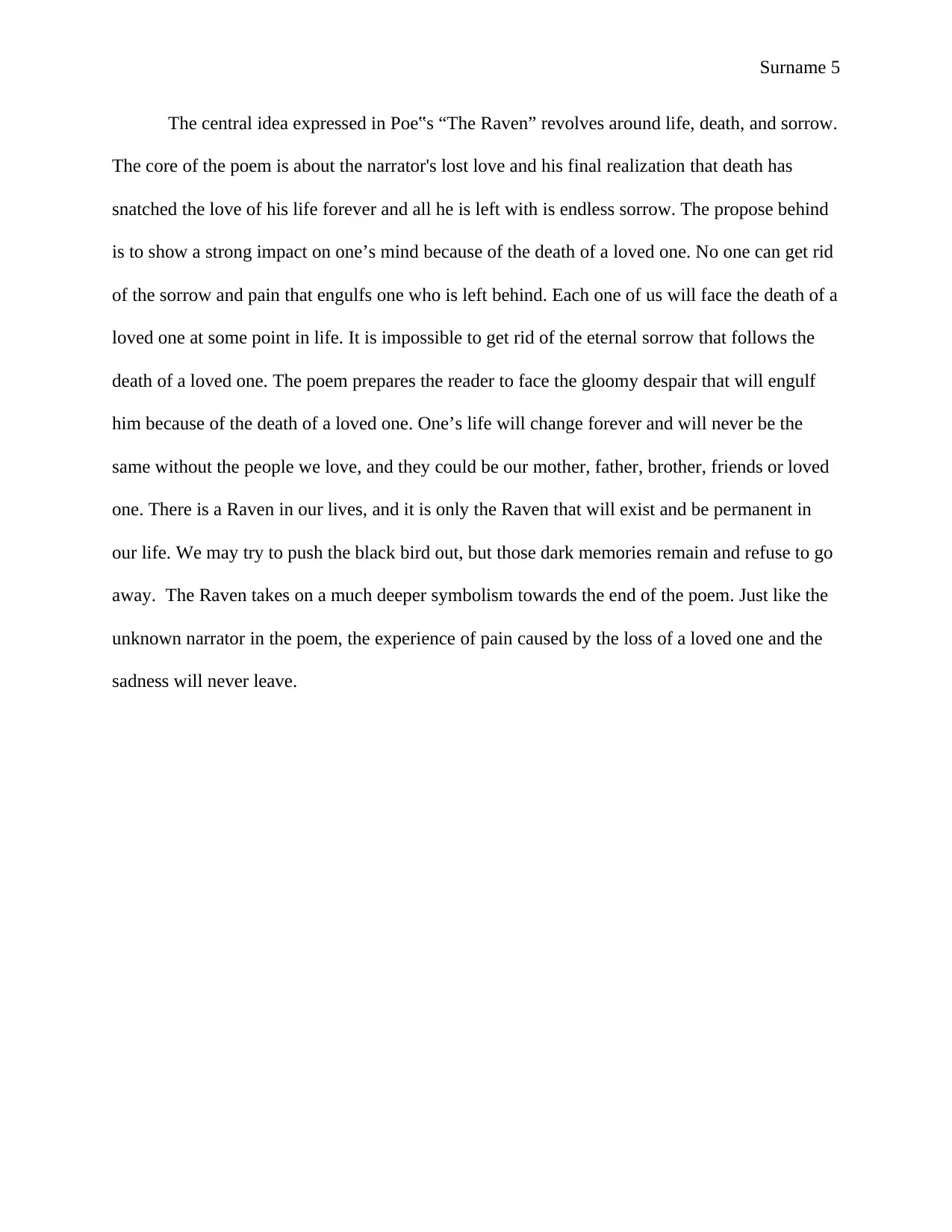
Surname 5
The central idea expressed in Poe‟s “The Raven” revolves around life, death, and sorrow.
The core of the poem is about the narrator's lost love and his final realization that death has
snatched the love of his life forever and all he is left with is endless sorrow. The propose behind
is to show a strong impact on one’s mind because of the death of a loved one. No one can get rid
of the sorrow and pain that engulfs one who is left behind. Each one of us will face the death of a
loved one at some point in life. It is impossible to get rid of the eternal sorrow that follows the
death of a loved one. The poem prepares the reader to face the gloomy despair that will engulf
him because of the death of a loved one. One’s life will change forever and will never be the
same without the people we love, and they could be our mother, father, brother, friends or loved
one. There is a Raven in our lives, and it is only the Raven that will exist and be permanent in
our life. We may try to push the black bird out, but those dark memories remain and refuse to go
away. The Raven takes on a much deeper symbolism towards the end of the poem. Just like the
unknown narrator in the poem, the experience of pain caused by the loss of a loved one and the
sadness will never leave.
The central idea expressed in Poe‟s “The Raven” revolves around life, death, and sorrow.
The core of the poem is about the narrator's lost love and his final realization that death has
snatched the love of his life forever and all he is left with is endless sorrow. The propose behind
is to show a strong impact on one’s mind because of the death of a loved one. No one can get rid
of the sorrow and pain that engulfs one who is left behind. Each one of us will face the death of a
loved one at some point in life. It is impossible to get rid of the eternal sorrow that follows the
death of a loved one. The poem prepares the reader to face the gloomy despair that will engulf
him because of the death of a loved one. One’s life will change forever and will never be the
same without the people we love, and they could be our mother, father, brother, friends or loved
one. There is a Raven in our lives, and it is only the Raven that will exist and be permanent in
our life. We may try to push the black bird out, but those dark memories remain and refuse to go
away. The Raven takes on a much deeper symbolism towards the end of the poem. Just like the
unknown narrator in the poem, the experience of pain caused by the loss of a loved one and the
sadness will never leave.
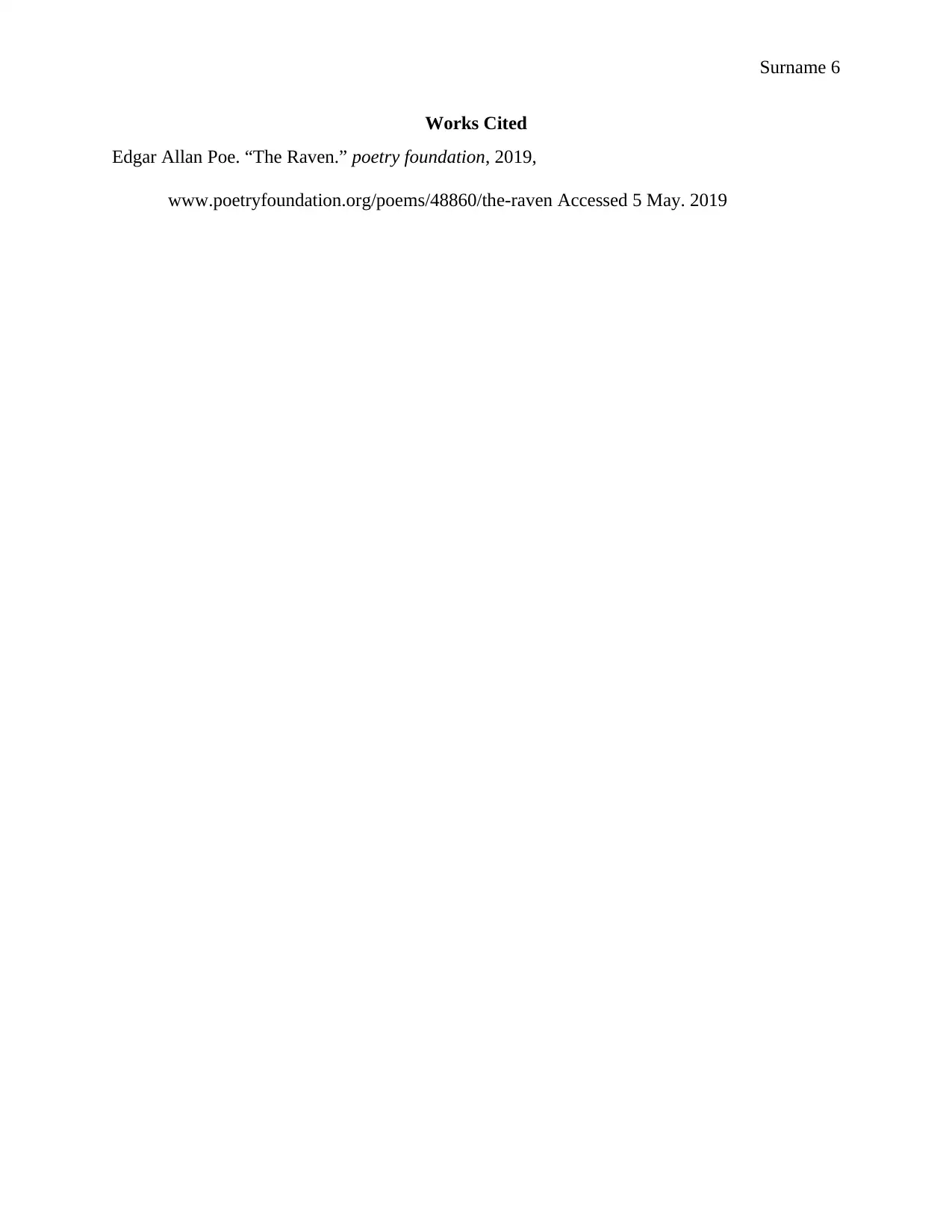
Surname 6
Works Cited
Edgar Allan Poe. “The Raven.” poetry foundation, 2019,
www.poetryfoundation.org/poems/48860/the-raven Accessed 5 May. 2019
Works Cited
Edgar Allan Poe. “The Raven.” poetry foundation, 2019,
www.poetryfoundation.org/poems/48860/the-raven Accessed 5 May. 2019
⊘ This is a preview!⊘
Do you want full access?
Subscribe today to unlock all pages.

Trusted by 1+ million students worldwide
1 out of 6
Your All-in-One AI-Powered Toolkit for Academic Success.
+13062052269
info@desklib.com
Available 24*7 on WhatsApp / Email
![[object Object]](/_next/static/media/star-bottom.7253800d.svg)
Unlock your academic potential
Copyright © 2020–2026 A2Z Services. All Rights Reserved. Developed and managed by ZUCOL.

